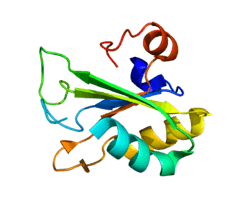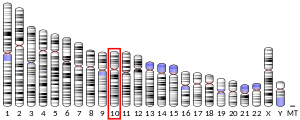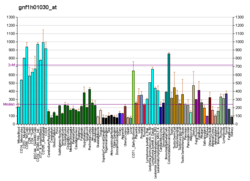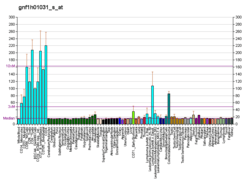RBM17
Splicing factor 45 is a protein that in humans is encoded by the RBM17 gene.[5][6]
References
- GRCh38: Ensembl release 89: ENSG00000134453 - Ensembl, May 2017
- GRCm38: Ensembl release 89: ENSMUSG00000037197 - Ensembl, May 2017
- "Human PubMed Reference:". National Center for Biotechnology Information, U.S. National Library of Medicine.
- "Mouse PubMed Reference:". National Center for Biotechnology Information, U.S. National Library of Medicine.
- Neubauer G, King A, Rappsilber J, Calvio C, Watson M, Ajuh P, Sleeman J, Lamond A, Mann M (Oct 1998). "Mass spectrometry and EST-database searching allows characterization of the multi-protein spliceosome complex". Nat Genet. 20 (1): 46–50. doi:10.1038/1700. PMID 9731529.
- "Entrez Gene: RBM17 RNA binding motif protein 17".
Further reading
- Graveley BR (2002). "Sex, AGility, and the regulation of alternative splicing". Cell. 109 (4): 409–12. doi:10.1016/S0092-8674(02)00750-X. PMID 12086596.
- Lallena MJ, Chalmers KJ, Llamazares S, et al. (2002). "Splicing regulation at the second catalytic step by Sex-lethal involves 3' splice site recognition by SPF45". Cell. 109 (3): 285–96. doi:10.1016/S0092-8674(02)00730-4. PMID 12015979.
- Strausberg RL, Feingold EA, Grouse LH, et al. (2003). "Generation and initial analysis of more than 15,000 full-length human and mouse cDNA sequences". Proc. Natl. Acad. Sci. U.S.A. 99 (26): 16899–903. doi:10.1073/pnas.242603899. PMC 139241. PMID 12477932.
- Sampath J, Long PR, Shepard RL, et al. (2003). "Human SPF45, a splicing factor, has limited expression in normal tissues, is overexpressed in many tumors, and can confer a multidrug-resistant phenotype to cells". Am. J. Pathol. 163 (5): 1781–90. doi:10.1016/S0002-9440(10)63538-9. PMC 1892446. PMID 14578179.
- Gerhard DS, Wagner L, Feingold EA, et al. (2004). "The status, quality, and expansion of the NIH full-length cDNA project: the Mammalian Gene Collection (MGC)". Genome Res. 14 (10B): 2121–7. doi:10.1101/gr.2596504. PMC 528928. PMID 15489334.
- Perry WL, Shepard RL, Sampath J, et al. (2005). "Human splicing factor SPF45 (RBM17) confers broad multidrug resistance to anticancer drugs when overexpressed--a phenotype partially reversed by selective estrogen receptor modulators". Cancer Res. 65 (15): 6593–600. doi:10.1158/0008-5472.CAN-03-3675. PMID 16061639.
- Rual JF, Venkatesan K, Hao T, et al. (2005). "Towards a proteome-scale map of the human protein-protein interaction network". Nature. 437 (7062): 1173–8. doi:10.1038/nature04209. PMID 16189514.
- Olsen JV, Blagoev B, Gnad F, et al. (2006). "Global, in vivo, and site-specific phosphorylation dynamics in signaling networks". Cell. 127 (3): 635–48. doi:10.1016/j.cell.2006.09.026. PMID 17081983.
- Chaouki AS, Salz HK (2007). "Drosophila SPF45: a bifunctional protein with roles in both splicing and DNA repair". PLoS Genet. 2 (12): e178. doi:10.1371/journal.pgen.0020178. PMC 1687153. PMID 17154718.
- Corsini L, Bonnal S, Bonna S, et al. (2007). "U2AF-homology motif interactions are required for alternative splicing regulation by SPF45". Nat. Struct. Mol. Biol. 14 (7): 620–9. doi:10.1038/nsmb1260. PMID 17589525.
This article is issued from Wikipedia. The text is licensed under Creative Commons - Attribution - Sharealike. Additional terms may apply for the media files.






